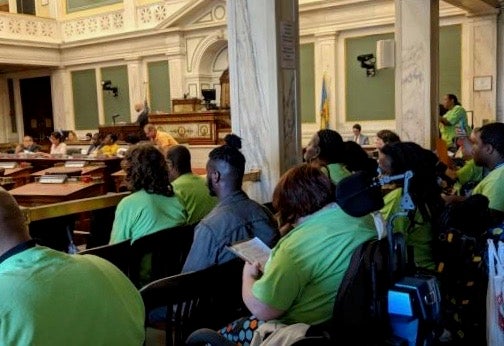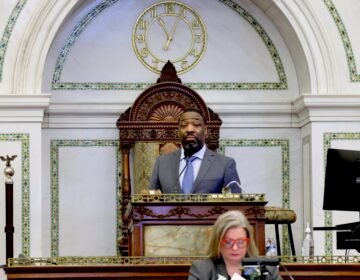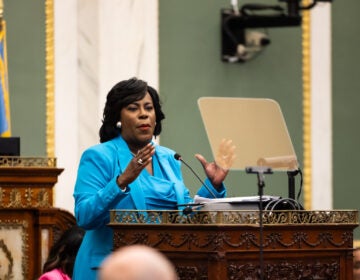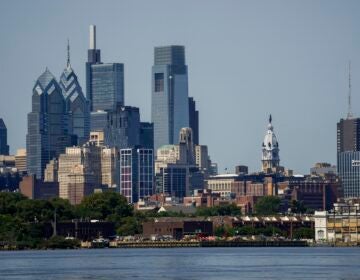As protestors heckle, affordable housing bills advance in City Council
A City Council committee voted unanimously to advance a package of affordable housing bills.

Representatives of the Philadelphia Coalition for Affordable Communities packed a Sept. 26 City Council hearing (Shaylin Sluzalis via Twitter)
A City Council committee voted unanimously on Wednesday to advance a package of affordable housing bills that would enable developers to tap city funds for middle-income projects.
The bills allow for the creation of a controversial new branch of the Philadelphia Housing Trust Fund, and the transfer of more than $19 million to this new sub-fund in fiscal year 2019. The last bill in the trio allows for additional transfers over the next four years.
The bills resulted from a compromise between City Council and Mayor Jim Kenney brokered in the first week of the fall session. That deal killed a tax on construction that the council had approved in the spring, and in exchange won a promise from the mayor to send as much as $71 million to housing programs.
City officials had an audience for their discussion of the bills. A couple dozen protesters wearing the neon green shirts of a local group called the Philadelphia Coalition for Affordable Communities greeted the affirmative committee vote by filing out of the chambers chanting, “Affordable, accessible, integrated housing.”
These protests were only the latest targeting the creation of the sub-fund, which some affordable housing groups have criticized because it does not specifically contribute to housing for the city’s poorest.
As it currently exists, half of every dollar that goes into the Housing Trust Fund must be spent on households earning 30 percent or less of area median income — roughly $30,000 for a family of four. Money from the fund is only accessible to nonprofit developers.
But money that goes into the new sub-fund could be spent on households up to 120 percent of AMI —or $105,000 for a family of four. For-profit entities would be eligible to tap the city fund.
“Why would anyone want to undermine the housing trust fund,” asked German Parodi, a leader of the advocacy group Disabled in Action. “The bad news is that … this sub-fund does just that, instead of putting desperately needed money into the trust fund.”
Philadelphia director of planning and development, Anne Fadullon said that she understands these concerns but that funding is needed to stabilize struggling working-class neighborhoods as well as the poorest areas.
“Across the income spectrum the city has way more need than resources,” said Fadullon. “We are putting a finger in the dike. That’s the most we can do.”
Fadullon cautioned that sub-fund investments in outlying, so-called “middle neighborhoods” could prevent them from becoming areas of concentrated poverty and divestment. She used the city’s nascent home-loan repair program as an example of public money being used to shore up struggling homeowners so they don’t join the ranks of the city’s neediest residents.
Councilman Kenyatta Johnson, who represents neighborhoods like Point Breeze in South Philadelphia, said he was intrigued by a provision that would allow revenues routed into the sub-fund to be spent on down payment and closing cost assistance. He said he saw such programs as a way to help African-American families who have been historically prevented from building wealth through redlining and other discriminatory housing practices.
“I consider this bill’s commitment to down payment assistance a crucial step in the right direction,” said Johnson after the hearing. “We know that 20th-century redlining led directly to today’s racial disparities in household wealth and access to home loans. [So] In Point Breeze, even affordable housing developments have been out of reach for constituents of color.”
These deliberations were punctuated by cries from the protesters: “What about renters?”
Fadullon also highlighted a couple other programs the city is considering, including what she called “a shallow rent subsidy.”
Research released on Wednesday by the Pew Charitable Trusts reported that less than 20 percent of the city’s low-income renters receive housing subsidies.
Fadullon also said the city is also working to find a way to produce affordable housing units more cheaply. Currently a new build affordable housing unit can cost $250-$300,000 per unit to construct, making it difficult to bring a substantial number of new units online.
“How do we get some help from our brothers and sisters who built those units and how do we reduce those costs,” said Fadullon, referring to the city’ powerful building trades unions, who are close allies of Mayor Kenney.
Councilwoman Maria Quiñones-Sánchez, who kickstarted City Council’s affordable housing debate over a year ago, said she was particularly curious about the administration’s plans to bring down construction costs.
“I look forward to some real leadership from the building trades,” said Quiñones-Sánchez, “in looking at modular housing and all the other options the city has resisted in the past to bring down the cost per unit the square footage costs per unit.”
Now that the bills have passed committee they can receive a first reading before the full City Council and could receive second reading and final passage as early as next week.
WHYY is your source for fact-based, in-depth journalism and information. As a nonprofit organization, we rely on financial support from readers like you. Please give today.







